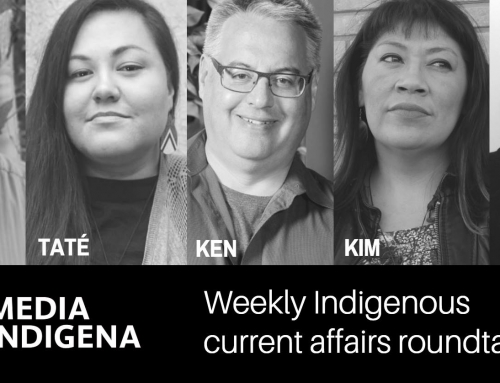Kim TallBear
[Days’ closing comments delivered July 12, 2017 at the Summer Internship for Indigenous Peoples in Genomics (SING), University of Arizona. I spoke from notes so have reconstructed these comments from notes and memory, elaborating slightly here on a couple of points made orally.]
Being inspired today and all week by Katrina Claw and Keolu Fox and all of the rest of the young Indigenous scientists in this room, I thought about you at one point as an “army of infiltrators.”
Nanibaa’ Garrison and others on the Indigenous Data Sovereignty panel earlier this week spoke about efforts by Indigenous communities, technologists, and organizations to control our own biological and other data rather than ceding control of it to settler institutions. They were thinking in terms of #datawarriors and asked what did we think of that hashtag?
At the University of Manitoba in October, 2013, I gave a talk titled “Combatting Colonial Technoscience: Lessons from the Frontlines.” The University of Manitoba audience—many of them Indigenous scholars and students—laughed. They brought to my attention how American that title sounded. I responded, “Oh, really?!” What was so obvious to my non-American audience had not been obvious to me despite my anti-militaristic values.
I mentioned this morning my misgivings about unquestioned US militarization, an integral part of US colonialism here in our homelands and US imperialism in the homelands of other Indigenous peoples around the world. I have struggled through much of my life with how to reconcile my anti-colonial opposition to the US flag and the patriotism my family largely rejects with simultaneous teachings to respect our elders and warriors. As you know, we spend a lot of time where I come from and throughout Indian Country honoring veterans. We especially do this at wacipi during grand entry. It took me decades through my childhood and into young adulthood to eventually settle on the idea that I stand for that eagle staff, which is at the center and held higher. The US and tribal flags are held a bit lower on either side. And I stand for our people. When I stand it is not for that US flag nor any idea of US patriotism. I understand that our people make many hard choices about how to live and survive in this settler world, e.g. enlistment. But I have long questioned the conflation the Dakota notion of akicita with western notions of war and being a soldier. And I have learned not to conflate the land with this nation state.
How did I not notice my own easy reliance then on war metaphors? The indoctrination of the US and its imperialism goes deep.
I wonder therefore if we might consider very consciously shifting the narrative from warring and being data warriors and science infiltrators to data and knowledge protectors? [I neglected to say during these spoken remarks that this caution is particularly aimed at US-based Indigenous people. The warrior metaphor may not be something we need to guard against as much if we are Indigenous peoples from a non-dominant country.]
Like the water protectors at Standing Rock and in the #NoDAPL movement, can we think of protecting data and these forms of science and technology knowledges we help build and decolonize? The other value that “protection” can imply is a recognition of the agency of the water, the land, the material bases of our bodies (not all of which are human). I found the water protectors at Standing Rock to be non-hierarchical in their use of that label for themselves. Their language of resistance, including Lakota language and philosophy, to the settler capitalist and police state recognized our human dependence upon water as a life-giver and life-carrier. With regard to scientific knowledges, “protection” can also imply that we do not simply “produce” knowledge about other humans and nonhuman bodies. We never constitute knowledge of the universe in a vacuum but are indebted to the understandings of the universe built into the bodies we study. We live in mutual dependence with them. We do not simply get to know them absent agency by them. Settler scientific assumptions about the lesser agencies of human and nonhuman subjects of study is a chronic problem in their hypotheses.
Perhaps there are even better Indigenous language words than “protector” to help you young Indigenous scientists think about these relationships and obligations as you do science. What words and values inhere in our languages that might be better for thinking with?
I am not being prescriptive. I know that #datawarriors is punchy, and that matters on social media. But I suggest that our metaphors of choice are culturally conditioned and may therefore integrate core values we may want to think more carefully about. Underlying concepts and values matter. They help generate certain kinds of research questions, and not others. Certain kinds of technologies, methodologies, and ethical frameworks, and not others.
Thank you for listening, and thank you for the work that you do as young Indigenous scientists.
Should we use #DataProtectors instead of #DataWarriors for indigenous data? Closing words at #SING2017AZ pic.twitter.com/QzoYIb2eXm
— Nanibaa' Garrison (@NanibaaGarrison) July 15, 2017
Katrina Claw gives moving account of seeking decolonial learning post-genetics PhD to do science that serves Indigenous people. #SING2017AZ pic.twitter.com/hsyIL6D4ma
— Kim TallBear (@KimTallBear) July 14, 2017
Busy day of DNA extraction at SING! #SING2017az pic.twitter.com/EyR6r5Xy8c
— StoneLab_ASU (@StoneLab_ASU) July 11, 2017
Growing the next generation of native scientists and academics #SING2017AZ pic.twitter.com/xg0dKMSwsp
— Maori DSov (@MaoriDSov) July 12, 2017

